|
|
|
Sort Order |
|
|
|
Items / Page
|
|
|
|
|
|
|
| Srl | Item |
| 1 |
ID:
123651
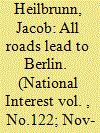

|
|
|
|
|
| Publication |
2012.
|
| Summary/Abstract |
BACK IN November 2011, as Europe struggled with its ongoing financial crisis, Poland's foreign minister, Radek Sikorski, gave a speech in Berlin that beckoned toward his country's western neighbor and pleaded with it to save the euro. "You know full well that nobody else can do it," said Sikorski. "I will probably be the first Polish foreign minister in history to say so, but here it is: I fear German power less than I am beginning to fear German inactivity. You have become Europe's indispensable nation."
|
|
|
|
|
|
|
|
|
|
|
|
|
|
|
|
| 2 |
ID:
099833
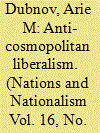

|
|
|
|
|
| Publication |
2010.
|
| Summary/Abstract |
The debate between contemporary cosmopolitans and advocates of nationalism is hardly new. Nevertheless, much of it is based on the erroneous assumption that cosmopolitanism should be seen as an outgrowth of liberalism, and that both should be considered as the complete conceptual opposites of nationalism. In this article I focus on two of the post-war Jewish anglophile intellectuals who took part in this debate during the Cold War years: the Oxonian liberal philosopher Sir Isaiah Berlin (1909-97) and the Israeli historian Jacob L. Talmon (1916-80). I use their examples to argue that the dividing line between cosmopolitans and advocates of nationalism should not be regarded as signifying the distinction between liberals and anti-liberals; in fact, this debate also took place within the camp of the liberal thinkers themselves. I divide my discussion into three parts. Firstly, I examine Berlin's and Talmon's positions within the post-war anti-totalitarian discourse, which came to be known as 'liberalism of fear'. Secondly, I show how a sense of Jewish identity, combined with deep Zionist convictions, induced both thinkers to divorce anti-nationalist cosmopolitanism - which they regarded as a hollow, illusionary ideal associated with impossible assimilationist yearnings - from the liberal idea. I conclude by suggesting that, although neither man had ever developed a systematic theoretical framework to deal with the complex interactions between ethno-nationalism, liberal individualism and multiculturalism, Berlin's vision of pluralism provides the foundations for building such a theory, in which liberalism and nationalism become complementary rather than conflicting notions.
|
|
|
|
|
|
|
|
|
|
|
|
|
|
|
|
| 3 |
ID:
132437
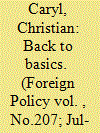

|
|
|
| 4 |
ID:
025844
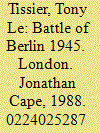

|
|
|
|
|
| Publication |
London, Jonathan Cape, 1988.
|
| Description |
xiii, 290p.: ill.Hbk
|
| Standard Number |
0224025287
|
|
|
|
|
|
|
|
|
|
|
|
Copies: C:1/I:0,R:0,Q:0
Circulation
| Accession# | Call# | Current Location | Status | Policy | Location |
| 029903 | 940.5421315/TIS 029903 | Main | On Shelf | General | |
|
|
|
|
| 5 |
ID:
090945
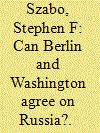

|
|
|
|
|
| Publication |
2009.
|
| Summary/Abstract |
Both Russia and Germany are back on the U.S. agenda. Russia will be a key element of a wide array of policies to the Obama administration, including dealing with Iran and the construction of a broader nonproliferation regime, energy security, nuclear arms reductions, and Afghanistan. Russia policy will also be central to U.S. designs for NATO, including how to deal with Georgia and Ukraine, and the viability of a pan-European security structure.
|
|
|
|
|
|
|
|
|
|
|
|
|
|
|
|
| 6 |
ID:
157211
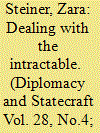

|
|
|
|
|
| Summary/Abstract |
Foreign Office diplomats recognised the danger to British security posed by Adolph Hitler’s accession to the chancellorship of Germany in January 1933 but differed on how to meet this challenge. This article reproduces the hitherto unpublished draft instructions prepared by Owen O’Malley, a ranking official at the Foreign Office, for the newly appointed ambassador to Germany, Sir Eric Phipps, on taking up his posting in autumn 1933. Sir Robert Vansittart, the permanent under secretary, who took a sceptical but not entirely hostile view of O’Malley’s proposals, minutes O’Malley’s suggestion of a clear warning to Hitler, accompanied by the opening of negotiations with Nazi Germany recognising its enhanced position and the justice of some of its claims. Vansittart did not forward the draft memorandum to the foreign secretary, Sir John Simon, and there is, as far as I know, no copy of this in the public archives. Included is additional information on the clashes between the two men on how dictators should be treated as well as biographical information on the careers of the three men involved in this debate.
|
|
|
|
|
|
|
|
|
|
|
|
|
|
|
|
| 7 |
ID:
093678
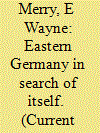

|
|
|
|
|
| Publication |
2010.
|
| Summary/Abstract |
The roots of the east's continuing alienation lie in the enforced, prolonged isolation that its society endured during most of the cold war.
|
|
|
|
|
|
|
|
|
|
|
|
|
|
|
|
| 8 |
ID:
093803
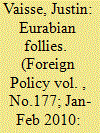

|
|
|
| 9 |
ID:
117429
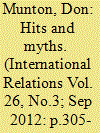

|
|
|
|
|
| Publication |
2012.
|
| Summary/Abstract |
Graham Allison's Essence of Decision: Explaining the Cuban Missile Crisis is recognized more for its general decision-making models than for its historical analysis. The second (1999) edition, co-authored with Philip Zelikow, adopts the same basic models and answers the same three 'central puzzles' of the missile crisis: (1) why did the USSR deploy nuclear missiles to Cuba; (2) why did the United States blockade Cuba; and (3) why did the USSR withdraw its missiles? This review article questions the answers Allison and Zelikow provide to each of these questions. In particular, I discuss the importance of the partially secret Khrushchev-Kennedy agreement as a factor in ending the crisis and present new evidence suggesting that Turkey may not, as usually assumed, have been opposed at the time of the crisis to decommissioning its US Jupiter missiles. I also suggest some additional missile crisis questions beyond the three 'central puzzles'.
|
|
|
|
|
|
|
|
|
|
|
|
|
|
|
|
| 10 |
ID:
141957
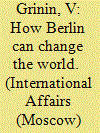

|
|
|
| 11 |
ID:
053828
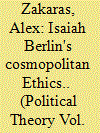

|
|
|
| 12 |
ID:
106887
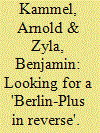

|
|
|
| 13 |
ID:
150077
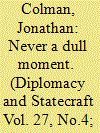

|
|
|
|
|
| Summary/Abstract |
This analysis explores the largely unsung Moscow ambassadorship of Britain’s Frank Roberts (1960–1962). After examining his Embassy’s role in developing cultural and commercial relations, the article addresses Roberts’ involvement in the Berlin and Cuban missile crises. In the former case, he made a low-key but important contribution by influencing American policy; in the second, he provided insightful assessments of Soviet attitudes and thinking. Roberts’ ambassadorship demonstrated the continued importance of resident embassies and ambassadors, because of the lack of ministerial-level Anglo–Soviet relations and the need to interpret Soviet policy in crisis situations. The research contributes to the literature of diplomatic representation as well as of Anglo–Soviet relations during the Cold War.
|
|
|
|
|
|
|
|
|
|
|
|
|
|
|
|
| 14 |
ID:
155535
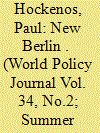

|
|
|
|
|
| Summary/Abstract |
Berlin’s gritty, inventive, do-it-yourself underside attracted droves of young, educated people. But now the tides of gentrification threaten the city’s quirky demeanor. World Policy Institute fellow Paul Hockenos explains how Berlin’s artists and residents are fighting back.
|
|
|
|
|
|
|
|
|
|
|
|
|
|
|
|
| 15 |
ID:
030547
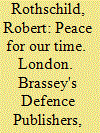

|
|
|
|
|
| Publication |
London, Brassey's Defence Publishers, 1988.
|
| Description |
xvi, 366p.Hbk
|
| Standard Number |
0080362648
|
|
|
|
|
|
|
|
|
|
|
|
Copies: C:1/I:0,R:0,Q:0
Circulation
| Accession# | Call# | Current Location | Status | Policy | Location |
| 030470 | 909.090904/ROT 030470 | Main | On Shelf | General | |
|
|
|
|
| 16 |
ID:
181201
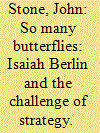

|
|
|
|
|
| Summary/Abstract |
Isaiah Berlin has not attracted much attention from academic strategists. This is unfortunate, because his concept of value pluralism helps explain why strategic decisions are burdened by uncertainty. It also highlights the importance of political judgement in reducing this uncertainty and the role of history in educating political judgement.
|
|
|
|
|
|
|
|
|
|
|
|
|
|
|
|
| 17 |
ID:
132294
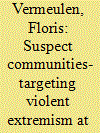

|
|
|
|
|
| Publication |
2014.
|
| Summary/Abstract |
Throughout Europe, authorities have set up new policy measures and programs to curb homegrown violent extremists. This article describes local policy responses to violent Islamic extremism-and/or the mere threat of it-in the neighborhoods Oost in Amsterdam, Moabit and Soldiner Kiez in Berlin, and Tower Hamlets in London. Based on locally conducted fieldwork, the study compares and contrasts these neighborhoods' approaches and aims to make a first assessment of their effects. A major finding for all three cities is that authorities target the entire local Muslim community rather than a few select individuals. This can lead to the construction of suspect communities, an approach with possible paradoxical effects on targeting actual violent extremists. Suspect communities subsequently create stigmatization, exclusion, and possibly marginalization, which not only has negative consequences for involved groups, but may well produce a breeding ground for future violence. However, the author did not find that engagement with Islamic organizations or individuals was used to directly change the nature of local Muslim communities. Orthodox and non-violent extremist organizations and individuals in all three cities were potential partners for engagement, which probably lowers the chance of stigmatizing the suspect communities.
|
|
|
|
|
|
|
|
|
|
|
|
|
|
|
|
| 18 |
ID:
174621
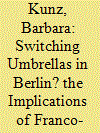

|
|
|
|
|
| Summary/Abstract |
In light of increasing doubts about US security guarantees, the idea of a greater role for the French nuclear deterrent in European security has gained a certain amount of traction, including among German politicians and citizens.
|
|
|
|
|
|
|
|
|
|
|
|
|
|
|
|
| 19 |
ID:
093704
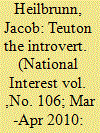

|
|
|
|
|
| Publication |
2010.
|
| Summary/Abstract |
FREIBURG, A university town nestled in a valley at the foot of the Black Forest in southwest Germany, is where the philosopher Martin Heidegger, who wore a Nazi Party badge for the special occasion, delivered his notorious rector's address in 1933, exhorting German students to fulfill the Fuhrer's vision by supporting the "national revolution." The medieval city was heavily bombed during World War II and occupied by the French. After the Berlin wall fell and the remaining occupation force departed in the early 1990s, a motley crew of house squatters and hippies moved into the former French barracks. But within a few years, the local city council converted the space into a gleaming town for the middle class called Vauban. When you visit this eco-town, it quickly becomes apparent that Vauban resembles nothing so much as a tarted-up socialist paradise. It leaves you with the feeling of having seen a small replica of East Germany-except that it actually works.
|
|
|
|
|
|
|
|
|
|
|
|
|
|
|
|
| 20 |
ID:
122264
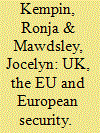

|
|
|
|
|
| Publication |
2013.
|
| Summary/Abstract |
While German commentators and politicians are primarily concerned with the economic impact of a possible 'Brexit' and the loss of a partner in EU economic negotiations, David Cameron's speech has also raised questions about the future of European security. For some in Berlin, the CSDP is unworkable without British participation; for others, the removal of the British veto would enable progress on CSDP institutions, long desired by Berlin. Here, Kempin and Mawdsley explore the apparent contradictions in German security policy, and the (possibly unwelcome) opportunities a Brexit might open up for Germany in relation to the CSDP.
|
|
|
|
|
|
|
|
|
|
|
|
|
|
|
|
|
|
|
|
|